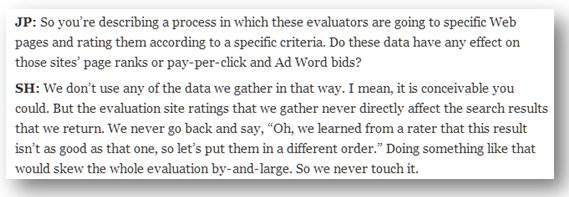
By Nell Terry in Featured
Hold onto your virtual horses,Internet. Google’s finally voiced anopinion about its secret army ofquality raters, delivered to you courtesy of Matt Cutts himself. Good news: according to a new Webmaster Help video uploaded to YouTube, their recommendations do not directly affect your website.
Supposedly.
Google’s been mightily “hush-hush” about the role of quality raters and how their opinions affect website positions in the SERPs. That’s why this new video infuses a, much-needed breath of fresh air into an otherwise murky aspect of G’s inner workings.
Oh yeah, and a little leaked info from the quality raters themselves doesn’t hurt, either.
Understanding Google’s Quality Rater
There are thousands of Google raters floating around out there. Too many to count. That’s why Google outsources the hiring and management of these employees to independent firms such as Lionbridge and Leapforce. The raters don’t work directly for Google per se, and things stay much cleaner that way. I’m also assuming that keeping these raters at arm’s length does a good job of protecting G’s trade secrets as well.
If you want to know about pay and working conditions, you can head over to the Google rater section of the WAHM forum. Employees discuss the ins and outs of the program and dish about all the juicy details that the work entails. For example, raters must pass a highly detailed exam before acceptance into the program. They also receive a fair hourly wage, but (this is the important part) they must keep up with a rigorous workload of fast-paced search page analysis.
Upon acceptance into the program, raters are given one of two tasks. In the new video, Cutts goes into detail about the first kind of rater assignment. Raters are typically given two sets of search result pages (a traditional list of ten results) to compare in a side-by-side analysis. Google instructs the raters to indicate whether they prefer the left-hand side of the search results or the right-hand side. Sounds simple, right? Maybe so, but try doing it in volume.
The second task for raters is all about keywords. This assignment falls on the more tedious end of the spectrum. Raters are furnished with a keyword and a URL. They’re charged with assessing the relevance of the given term in relation to the URL’s destination. Keep in mind for this task – they do have the option of marking a specific URL as spam. Remember that – it’ll be important later on.
How Rater Feedback is Weighted
How Rater Feedback is Weighted
Cutts’ video also clears up some widely held misconceptions about quality raters that have been floating around the ‘net for quite some time now. Cutts first points out that Google instructs evaluation raters (“quality raters”) to judge page quality and rate navigation, among other things.
However, warns Cutts, “Those people don’t influence the algorithm in any direct sense.”
When raters are given the above-mentioned side-by-side analysis task, their opinions do not directly affect the websites in the samples. This is precisely where many people get confused into thinking raters are somehow “penalizing” their websites. It’s simply not so.
When a quality rater indicates he or she doesn’t care for a particular website, that opinion doesn’t cause site to tank. Instead, the aggregate of raters’ opinions becomes data Google uses to tweak the algorithms themselves and not individual websites – see the distinction? With billions upon billions of websites on the ‘net, it makes more sense to use the data to tweak things on a macro level.
And, for those of you who still have doubts, all this lines up perfectly with a 2009 interview between John Paczowski and Scott Huffman (the Engineering Director at Google).
Here’s a snippet from the exchange:
Here’s a snippet from the exchange:
Image1:


Takeaways
Google has a super-secret book of guidelines for its raters to use while they work. In an act of incredible Internet espionage, some savvy marketers got a hold of the leaked manual and posted the info all over the Web. Unfortunately, Google acted fast to remove the offending material via a series of uber threatening emails. All this scandal makes Cutts’ remark at the end of his video ridiculously exciting – he says that Google may release the coveted rater guidelines to the public at some point in the near future.
One of the most important aspects of the job that raters are talking about in the forum is the speed with which they must complete their assignments. Most remark that reading the rich text snippets listed below each page (as opposed to visiting each website) when comparing search result pages side-by-side is the only way to realistically get through the work volume and keep the gig.
For you, this means that the snippet listed with every one of your ranked pages must be relevant to the query for which you rank. Also, it must be grammatically flawless and highly interesting. Keeping things spam-free will work in your favor as well.
Bottom line: Google raters’ answers won’t directly affect your website’s placement in the SERPs – unless enough of them mark your site as spam.
All this info means, essentially, that Google raters do matter – their macro-level data affects the way algorithms are constructed and altered. On a micro level, however, if your website is not spam, you really have nothing fear. Save all that pent-up anxiety for the next big algo update instead.
Nell Terry is a tech news junkie, fledgling Internet marketer and staff writer for SiteProNews, one of the Web’s foremost webmaster and tech news blogs. She thrives on social media, web design, and uncovering the truth about all the newest marketing fads that pop up all over the ‘net. Find out more about Nell by visiting her online portfolio at Content by Nell.


No comments:
Post a Comment